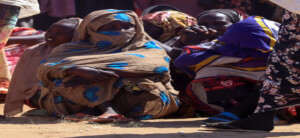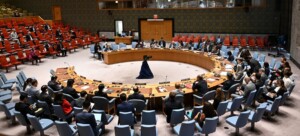Sudan: ‘Exit Unamid not owing to mass rape investigation’
The Sudanese government informed Unamid two weeks ago to prepare an exit strategy, according to the state media agency Suna, based on a statement of the under-secretary of Foreign Affairs.Abdallah Azraq claimed on Friday that the allegations of mass rape in Tabit in North Darfur came after Sudan’s request of an exit strategy for Unamid. However, the Unamid spokesman said that he is not aware of any request of the government to prepare an exit strategy. The under-secretary asserted to the press on Friday that the rape allegations came in order to justify the continuation of Unamid. “After 10 years of civil war, Darfur became stable. To justify the presence of Unamid they fabricated the story on the mass rape in Tabit. We expect that more of such allegations will follow”, Azraq told the press.The alleged mass rape of many, probably 200, women and girls took place on 31 October and was reported by Radio Dabanga two days later.Investigation rejected twiceThe under-secretary added that “Sudan had rejected a fresh UN request to visit the village of Tabit. The new investigation was an attempt to create an atmosphere for further escalation and decisions against Sudan. To re-investigate allegations of mass rape is a humiliation for the state and a violation of the sovereignty of the state. There is no self-respecting government that will accept these violations and humiliation.” The call for independent investigations followed interviews by Radio Dabanga with victims, health workers and elders of the community confirming the incident. Unamid on 4 November was stopped to investigate the case and the patrol was sent back. On 9 November, a group of 18 UN workers were allowed to enter Tabit, but they were accompanied by armed forces, security officers and police. According to an internal UN report, the villagers told Unamid that they were warned not to speak about the rape case. The UN investigators described it was not able to speak freely, as “interviews being captured on recording devices (mobile phone) by the SAF [army, ed.] members,” as the internal report states. The report further noted that: “The behaviour and responses of interviewees indicated an environment of fear and intimidation”. After this internal report was leaked to the press, Unamid was urged by UN Chief Ban Ki-moon and the UN Security Council to continue investigations into the case. After the second rejection for investigations, US ambassador to the UN, Samantha Power, tweeted: ‘Sudan has now twice denied access to UN for investigation of mass rape in Darfur, despite appeals by the UN Security Council and Ban Ki-Moon. What’s it hiding?’The internal Unamid investigation report notices that in the meantime, material evidence might have disappeared.’Exit takes time ‘Abdallah explained: “Sudan formally requested [repeating, ed.] -I formally requested- that Unamid makes an exit strategy. That does not mean it will have to pack right away. It is a long process and has internationally recognised procedures.” The under-secretary gave no reason for the formal request, but he repeated that the formal request to leave the country came before the mass rape allegations. Flawed mission UnamidThe entire leaked internal Unamid report is published by Eric Reeves, a US scholar publishing on Sudan for fifteen years. The report reveals that Unamid had no prepared formats or types of interviewing available to investigate an alleged mass rape case in Tabit. “An agreed set of questions were not developed and deployed,” the internal report concludes. The same report admits that ‘Sexual violence in Darfur, since the start of conflict (2003), is a key issue’. However, the mission seemed not to have procedures and protocols in place: ‘Each sub-team had to rely on their own previous experience and expertise to find the information required’. The ad hoc investigation mission compiled of 18 members coming from different UN offices and departments had only a short debriefing before taking off to Tabit. Unamid estimates the maximum population of Tabit between 7,000 and 8,000 people. A sub-team observed that the local population “consider the SAF to be the lesser evil as compared to the SLA [rebel Sudan Liberation Army, ed.]”. The report suggests that: ‘The improved economic conditions in Tabit (good fertile land, Qatar developmental projects, et cetera) may also influence locals to not cooperate frankly with Unamid field missions’. ‘Conspiracy against Sudan’On Friday, the under-secretary also mentioned the development projects. Azraq: “The allegations of mass rape are a conspiracy against Sudan, by the Darfur rebel movements. This village is currently witnessing the establishment of services and projects for reconstruction to support families, and agricultural associations. There are more than 45 development projects at a total cost of six million dollars donated by the State of Qatar. This makes this village a model village, encouraging the voluntary return of the displaced.” However, the internal report noticed the opposite: ‘The sub-teams also observed a small number of adult population (male and females) available in the town. It was informed that a lot of people go out to farms in the morning, but compared to the SAF personnel numbers present, the low number of town people was quite conspicuous’. Tabit has been the battlefield between several rebel movements and militias. A significant part of the population have houses in Zamzam camp for displaced people or Shangil Tobaya town. They move to Tabit during the harvest season. File photo: A displaced woman in Zamzam camp, located between El Fasher and Tabit in North Darfur, talks to a Unamid staff member (Unamid)Related:Sudan again blocks Unamid’s mass rape investigation (17 November 2014) Sudan Foreign Ministry summons Unamid head over Darfur rape allegations (14 November 2014)
The Sudanese government informed Unamid two weeks ago to prepare an exit strategy, according to the state media agency Suna, based on a statement of the under-secretary of Foreign Affairs.
Abdallah Azraq claimed on Friday that the allegations of mass rape in Tabit in North Darfur came after Sudan's request of an exit strategy for Unamid. However, the Unamid spokesman said that he is not aware of any request of the government to prepare an exit strategy.
The under-secretary asserted to the press on Friday that the rape allegations came in order to justify the continuation of Unamid. “After 10 years of civil war, Darfur became stable. To justify the presence of Unamid they fabricated the story on the mass rape in Tabit. We expect that more of such allegations will follow”, Azraq told the press.
The alleged mass rape of many, probably 200, women and girls took place on 31 October and was reported by Radio Dabanga two days later.
Investigation rejected twice
The under-secretary added that “Sudan had rejected a fresh UN request to visit the village of Tabit. The new investigation was an attempt to create an atmosphere for further escalation and decisions against Sudan. To re-investigate allegations of mass rape is a humiliation for the state and a violation of the sovereignty of the state. There is no self-respecting government that will accept these violations and humiliation."
The call for independent investigations followed interviews by Radio Dabanga with victims, health workers and elders of the community confirming the incident. Unamid on 4 November was stopped to investigate the case and the patrol was sent back. On 9 November, a group of 18 UN workers were allowed to enter Tabit, but they were accompanied by armed forces, security officers and police.
According to an internal UN report, the villagers told Unamid that they were warned not to speak about the rape case. The UN investigators described it was not able to speak freely, as “interviews being captured on recording devices (mobile phone) by the SAF [army, ed.] members,” as the internal report states. The report further noted that: “The behaviour and responses of interviewees indicated an environment of fear and intimidation”.
After this internal report was leaked to the press, Unamid was urged by UN Chief Ban Ki-moon and the UN Security Council to continue investigations into the case. After the second rejection for investigations, US ambassador to the UN, Samantha Power, tweeted: 'Sudan has now twice denied access to UN for investigation of mass rape in Darfur, despite appeals by the UN Security Council and Ban Ki-Moon. What's it hiding?'
The internal Unamid investigation report notices that in the meantime, material evidence might have disappeared.
'Exit takes time '
Abdallah explained: "Sudan formally requested [repeating, ed.] -I formally requested- that Unamid makes an exit strategy. That does not mean it will have to pack right away. It is a long process and has internationally recognised procedures." The under-secretary gave no reason for the formal request, but he repeated that the formal request to leave the country came before the mass rape allegations.
Flawed mission Unamid
The entire leaked internal Unamid report is published by Eric Reeves, a US scholar publishing on Sudan for fifteen years. The report reveals that Unamid had no prepared formats or types of interviewing available to investigate an alleged mass rape case in Tabit. “An agreed set of questions were not developed and deployed,” the internal report concludes.
The same report admits that ‘Sexual violence in Darfur, since the start of conflict (2003), is a key issue'. However, the mission seemed not to have procedures and protocols in place: 'Each sub-team had to rely on their own previous experience and expertise to find the information required'.
The ad hoc investigation mission compiled of 18 members coming from different UN offices and departments had only a short debriefing before taking off to Tabit.
Unamid estimates the maximum population of Tabit between 7,000 and 8,000 people. A sub-team observed that the local population “consider the SAF to be the lesser evil as compared to the SLA [rebel Sudan Liberation Army, ed.]”. The report suggests that: 'The improved economic conditions in Tabit (good fertile land, Qatar developmental projects, et cetera) may also influence locals to not cooperate frankly with Unamid field missions'.
'Conspiracy against Sudan'
On Friday, the under-secretary also mentioned the development projects. Azraq: “The allegations of mass rape are a conspiracy against Sudan, by the Darfur rebel movements. This village is currently witnessing the establishment of services and projects for reconstruction to support families, and agricultural associations. There are more than 45 development projects at a total cost of six million dollars donated by the State of Qatar. This makes this village a model village, encouraging the voluntary return of the displaced.”
However, the internal report noticed the opposite: 'The sub-teams also observed a small number of adult population (male and females) available in the town. It was informed that a lot of people go out to farms in the morning, but compared to the SAF personnel numbers present, the low number of town people was quite conspicuous'.
Tabit has been the battlefield between several rebel movements and militias. A significant part of the population have houses in Zamzam camp for displaced people or Shangil Tobaya town. They move to Tabit during the harvest season.
File photo: A displaced woman in Zamzam camp, located between El Fasher and Tabit in North Darfur, talks to a Unamid staff member (Unamid)
Related:
Sudan again blocks Unamid's mass rape investigation (17 November 2014)
Sudan Foreign Ministry summons Unamid head over Darfur rape allegations (14 November 2014)











 and then
and then